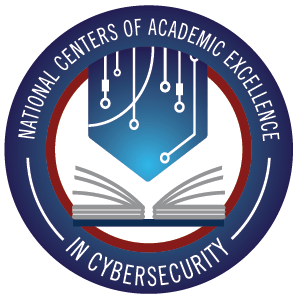
Master of Science
in Cybersecurity
4-week
COURSES
Start sooner and finish faster with our innovative course design.
Year-round
enrollment
Our admissions team reviews applications year-round.
220Kk+ Alumni Worldwide
Become a member of NU’s global community.
Master of Science in Cybersecurity
If you can envision yourself helping to ensure the security, confidentiality, integrity, authenticity, control, availability, and utility of the world’s computing and information systems infrastructure, National University’s MS in Cybersecurity program will give you the technical and managerial skills you need to achieve your career aspirations.
In this rigorous online curriculum, we challenge our students to design, build and implement the computing and systems that address the major issues our society is wrestling with. It’s a professionally focused degree for those who endeavor to help secure the world’s computer and information systems infrastructure.
Help Protect the World’s Computing and Information Systems
In this industry-current program, you’ll have a choice of two specializations – Ethical Hacking and Pen Testing or Enterprise Cybersecurity Management. Whichever path you choose, NU’s MS in Cybersecurity is designed to address the pressing need for open jobs worldwide.


The National Security Agency (NSA) has designated National University as a National Center of Academic Excellence (NCAE) in Cyber Defense (CAE-CD) through 2028. More information on the National Center of Academic Excellence (NCAE) in Cybersecurity program can be found here: https://www.nsa.gov/Academics/Centers-of-Academic-Excellence/

The Western Association of Schools and Colleges (WASC) accredits public and private schools, colleges, and universities in the U.S.
Course Details
Course Listing
Core Requirements
- 9 Courses; 40.5 quarter units
Course Name
Examines the fundamental concepts of cybersecurity and the associated technology. Includes securing the environment, security technologies in the environment, security threats, and security responses. Ethical and legal aspects of cybersecurity are also examined.
Prerequisite: CYB 600 with a minimum grade of B.
An introduction to the tools and techniques utilized in cyber defense and offensive cyber operations. Use of technical tools will be demonstrated in virtual lab environments.
Prerequisite: CYB 601
Analysis and evaluation of threat modeling and cyber threat intelligence to reduce risk and enhance organizational Cybersecurity posture. Development and use of threat models to identify threats to systems and applications. Methods for collecting and utilizing threat intelligence to identify organizational threats are also covered.
Prerequisite: CYB 602
Concepts covered include a comprehensive wireless and mobile security overview including the design, planning, installation, and maintenance of wireless network security infrastructures. Emphasis is placed on information warfare countermeasures relative to government, military, terrorist and rogue, and private enterprise demographics.
Prerequisite: CYB 604
An introduction to the concepts of network security monitoring and incident response. Students will conduct an analysis and evaluation of network security monitoring tools and techniques. Students will examine the methods for conducting incident response.
Prerequisite: CYB 606
An introduction to the concepts of cloud computing. This course will examine the security implications of operating in a cloud computing environment. Tools and techniques to implement DevSec ops will be introduced.
Prerequisite: CYB 608 and completion of one specialization area.
A Master’s level project dealing with a student’s area of specialization in the Cyber Security and Information Assurance program. The students will create an original project with practical applications using cybersecurity policy, regulatory, and testing frameworks. The project will integrate the concepts of cyber security and information assurance taught throughout the program. Project management techniques and collaboration will be emphasized along with the ethical and legal aspects of the project. Grading is H, S, U only.
Prerequisite: CYB 699A
Master’s level project dealing with a student’s area of specialization in the Cyber Security and Information Assurance program. The students will create an original project with practical applications using cybersecurity policy, regulatory, and testing frameworks. Project management technqiues and collaboration will be emphasized along with the ethical and legal aspects of the project. Grading is H, S or U only.
Prerequisite: CYB 699B with a minimum grade of S. Students to successfully complete CYB 699B
Master’s level project dealing with a student’s area of specialization in the Cyber Security and Information Assurance program. The students will create an original project with practical applications using cybersecurity policy, regulatory, and testing frameworks. Project management techniques and collaboration will be emphasized along with the ethical and legal aspects of the project. Project results will be presented to a panel for review. Grading is by H, S or U only.
Students must select one area of specialization
Specialization in Enterprise Cybersecurity Management
This specialization requires 18 graduate units at National University.
Program Requirements:
- 4 courses; 18 quarter units
Specializations
Prerequisite: CYB 607
This class focuses on the legal and regulatory requirements, ethical issues, basic methodology and technical tools to conduct cybersecurity audits and assessments. Students will explore the frameworks, tools, and techniques to conduct a cybersecurity assessment.
Prerequisite: CYB 608
Students will explore the development of cybersecurity policy for commercial and government organizations. The legal and regulatory requirements for cybersecurity policy development will be examined.
Prerequisite: CYB 612
An examination of the functions and processes to implement and monitor cybersecurity controls across an organization. An exploration of commercial and government compliance requirements.
Prerequisite: CYB 613
An examination of the methods and frameworks for implementing and managing an enterprise cybersecurity program. Students will explore various frameworks and tools to develop and manage a cybersecurity program that supports an organization’s mission.
Specialization in Ethical Hacking & Pen Testing
Program Requirements:
- 4 courses; 18 quarter units
Specializations
Prerequisite: CYB 607
This class focuses on the legal and regulatory requirements, ethical issues, basic methodology and technical tools to conduct cybersecurity audits and assessments. Students will explore the frameworks, tools, and techniques to conduct a cybersecurity assessment.
Prerequisite: CYB 608
Students will apply principles of penetration testing to identify and exploit vulnerabilities in networked and cloud based information systems and make recommendations for mitigation.
Prerequisite: CYB 632
Red Teaming, or Alternative Analysis, is the practice of viewing a problem from an adversarial or competitor’s perspective. The objective of Red Teams is to enhance decision making, practices of secured system protection applicable by establishing countermeasures of defense. Students will learn to employ actively open-minded/problem solving and unbiased thinking to conduct red team assessments.
Prerequisite: CYB 633
Students will analyze and utilize advanced penetration testing tools and techniques. Web application attack tools and techniques will be examined.
Degree and Course Requirements
All students who seek to enroll in the MS Cybersecurity (MS CYB) program must interview with the Faculty Advisor prior to enrolling in the first course of the program.
To obtain the Master of Science in Cybersecurity, students must complete 58.5 graduate units. A total of 13.5 quarter units of graduate credit may be granted for equivalent graduate work completed at another regionally accredited institution, as it applies to this degree, and provided the units were not used in earning another advanced degree. All students must complete the nine core requirements and choose an area of specialization.
Please refer to the graduate admissions requirements for specific information regarding application and evaluation. To Reach out to speak with an admissions counselor for additional course requirements and elective options.
Specializations
Master of Science in Cybersecurity, Enterprise Cybersecurity Management
The Enterprise Cybersecurity Management specialization focuses on programmatic management and governance skills for organizational cybersecurity. In addition to foundational knowledge and tools for securing network, cloud and wireless systems, you’ll learn to assess and manage the vulnerabilities and protections of these IT environments. This specialization focuses on larger organizations (often in government) that have codified standards, policies, and practices for their information systems.
Learn MoreMaster of Science in Cybersecurity, Ethical Hacking and Pen Testing
The Ethical Hacking & Pen Testing specialization focuses on testing enterprise systems by probing network and information security components with simulated attacks. These exercises and simulations prepare professionals for: developing rules of engagement, preparing cybersecurity tool kits, discovering and exploiting system vulnerabilities, ethically conducting penetration tests, and preparing penetration test documentation. Red-Teaming practices and Red vs. Blue team exercises will be executed and assessed as an important part of the coursework.
Learn MoreA master’s in cybersecurity degree opens doors in a variety of industries, including finance and insurance, manufacturing, information services, health care, administrative support services, and scientific and technical services. Whether you’re looking to change your career path or start your career in IT, the skills you gain in National University’s Master of Science in Cybersecurity can give you the edge you need to stand out in the job market.
Cybersecurity is a field that’s rapidly expanding and in need of professionals with up-to-date knowledge and skills. For example, employment of information security analysts is projected to grow 33 percent from 2020 to 2030, which is dramatically faster than the average for all occupations, according to the Bureau of Labor Statistics. It can also be a lucrative career move, with a median annual wage of $102,600 and the top 10 percent earning more than $165,920.*
Employers in the cybersecurity field are looking for workers with skills in communications, management, operations, leadership, infrastructure, information technology, innovation, integration, and research. With this master’s degree from National University, you’ll be prepared to seek a variety of roles in cybersecurity, including:**
- Information Systems Security Manager
- Director of Information Security
- Network Engineer
- Systems Administrator
- Systems Engineer
- Cybersecurity Engineer
- Cybersecurity Analyst
- Cybersecurity Consultant
- Penetration & Vulnerability Tester
- IT Auditor
- Cybersecurity Architect
To learn more about career opportunities in the field of cybersecurity, read our post: Is a Cybersecurity Degree Worth It?
*SOURCE: https://www.bls.gov/ooh/computer-and-information-technology/information-security-analysts.htm
**SOURCE: Emsi Labor Analyst- Report. Emsi research company homepage at https://www.economicmodeling.com/company/ (Report viewed: May 3, 2022). DISCLAIMER: The data provided is for Informational purposes only. Emsi data and analysis utilizes government sources to provide insights on industries, demographics, employers, in-demand skills, and more to align academic programs with labor market opportunities. Cited projections may not reflect local or short-term economic or job conditions and do not guarantee actual job growth. Current and prospective students should use this data with other available economic data to inform their educational decisions.
The field of cybersecurity is robust and offers numerous pathways to difference-making careers. To provide the industry with highly skilled professionals on the cutting edge of the market’s current and expected needs, National University’s MS in Cybersecurity offers two career-focused specializations:
Ethical Hacking and Pen Testing – In this specialization, you’ll focus on ethical hacking and penetration (Pen) testing where you will probe network and information system security components by conducting simulated attacks on systems. It’s designed to provide you with the unique applications involved in Cybersecurity and Information Assurance (CSIA). You’ll also learn how to develop rules of engagement, prepare a toolkit, discover and exploit system vulnerabilities, ethically conduct a penetration test, and prepare penetration test documentation.
Enterprise Cybersecurity Management – The specialization in Enterprise Cybersecurity Management provides study in the professional domain of cybersecurity that focuses on the programmatic management and governance of cybersecurity for organization. This arena particularly involves larger organizations, often in government, that have codified standards, policies, and practices for this field.
National University students are encouraged to joint our Cyber Team Nucl3@r. The cyber team apply the knowledge and skills they gain in class by competing in challenging cyber competitions like the Western Regional Collegiate Cyber Defense Competition, Collegiate Pentest Competition, National Cyber League, and Cyberforce Competition. These competitions also allow students to demonstrate their skills to potential employers.
Program Learning Outcomes
Upon successful completion of National University’s master’s in cybersecurity program, graduates will be able to:
- Devise a mitigation plan against both external and internal vulnerabilities to enterprise computer infrastructures and sensitive digital assets
- Analyze and evaluate multiple risk assessment methods and strategies
- Compare and contrast the legal and ethical aspects of cybersecurity at the federal, state, and international level
- Assess and summarize the legal and ethical requirements of a cybersecurity professional
- Integrate project management skills to produce a cybersecurity solution
- Evaluate the results of a security assessment to assess the security status of a network or computer system
- Conduct in-depth research into a specific CSIA topic, including finding and integrating relevant research results of others
- Integrate systems-level infrastructure thinking into CSIA problem identification and resolution and effectively communicate the solution
Our four-week courses and online options work with your schedule to get the most out of our MS in Cybersecurity program. You could start as early as next month!
Hear From Our Faculty
Watch our video featuring Dr. Ronald Uhlig, Academic Program Director, Department of Engineering.

“Balance life and business – may seem difficult but it’s not impossible. Stick with it and great things will follow.”
– Christopher Simpson, Academic Program Director, Master of Science in Cybersecurity
Admissions
Enrolling in a university is a big decision. That’s why our dedicated admissions team is here to guide you through the admissions process and help you find the right program for you and your career goals.
To that end, we’ve simplified and streamlined our application process, so you can get enrolled in your program right away. Because we accept and review applications year round, you can begin class as soon as next month, depending on your program and location of choice.
Learn more about undergraduate, graduate, military, and international student admissions, plus admissions information for transfer students. You can also learn more about our tuition rates and financial aid opportunities.
To speak with our admissions team, call (855) 355-6288 or request information and an advisor will contact you shortly. If you’re ready to apply, simply start your application today.

4 WEEK COURSES
Why Choose National University
- Four-Week Courses
- 190+ Degree Programs
- Online or On-Site
- Year-Round Enrollment
- Military Friendly
We’re proud to be a Veteran-founded, San Diego-based nonprofit. Since 1971, our mission has been to provide accessible, achievable higher education to adult learners. Today, we educate students from across the U.S. and around the globe, with over 220,000 alumni worldwide.

“The MS Cybersecurity program was an awesome technical experience! It was great to get actual real-world experience for the skills you are learning, as well as the key business components that relate to the such as project management, presentation, and teamwork.”
– Jonathan Race, Class of 2018, Founding Cyber Team Captain
Useful Links

FLEXIBLE SCHEDULE

The Key Grant Scholarship
Do you qualify for a needs-based scholarship? Learn more about the NU Key Grant Scholarship and other scholarship opportunities to unlock the door to your dreams!
Program Disclosure
Successful completion and attainment of National University degrees do not lead to automatic or immediate licensure, employment, or certification in any state/country. The University cannot guarantee that any professional organization or business will accept a graduate’s application to sit for any certification, licensure, or related exam for the purpose of professional certification.
Program availability varies by state. Many disciplines, professions, and jobs require disclosure of an individual’s criminal history, and a variety of states require background checks to apply to, or be eligible for, certain certificates, registrations, and licenses. Existence of a criminal history may also subject an individual to denial of an initial application for a certificate, registration, or license and/or result in the revocation or suspension of an existing certificate, registration, or license. Requirements can vary by state, occupation, and/or licensing authority.
NU graduates will be subject to additional requirements in a program, certification/licensure, employment, and state-by-state basis that can include one or more of the following items: internships, practicum experience, additional coursework, exams, tests, drug testing, earning an additional degree, and/or other training/education requirements.
All prospective students are advised to review employment, certification, and/or licensure requirements in their state, and to contact the certification/licensing body of the state and/or country where they intend to obtain certification/licensure to verify that these courses/programs qualify in that state/country, prior to enrolling. Prospective students are also advised to regularly review the state’s/country’s policies and procedures relating to certification/licensure, as those policies are subject to change.
**Positions may require additional experience, training, and other factors beyond successfully completing this degree program. Depending on where you reside, many positions may also require state licensure, and it is the responsibility of the student to ensure that all licensure requirements are met. We encourage you to also review program-specific requirements. Any data provided on this page is for informational purposes only and does not guarantee that completion of any degree program will achieve the underlying occupation or commensurate salary.